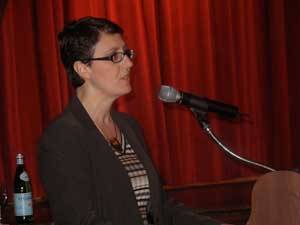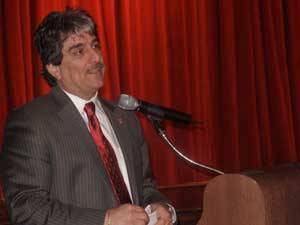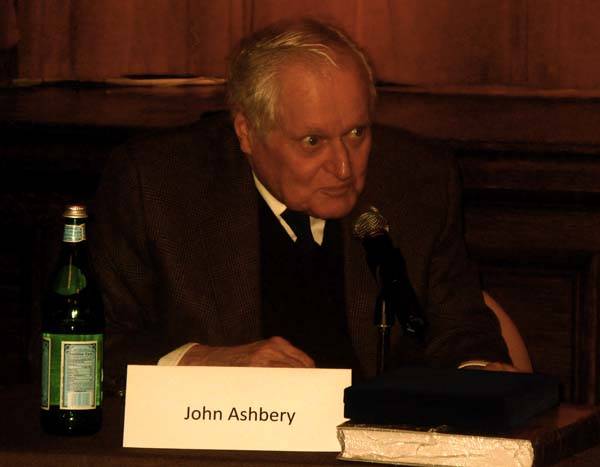Premio Napoli Prize. A Neapolitan Tribute to John Ashbery in NYC
Fin dal libro di esordio: Some trees, pubblicato nel 1956 con la prefazione di Auden, l’opera di John Ashbery è stata caratterizzata da due elementi apparentemente contraddittori: rinnovamento e durata, sperimentalismo e durata. Con “Un mondo che non può essere migliore”, la giuria premia il maestro della vastità e del dettaglio, del mondo come meditazione e come sguardo. Critico d’arte, raffinato musicologo, Ashbery crea poesie-quadri e poesie –partiture. Il suono abita lo spazio della pagina e ritma con la luce, i pensieri appaiono in folate, fragili come nebbie ma trattenute dalla struttura, nell’architettura dei versi.
("From his very first book, 'Some Trees', published in 1956 with a preface by Auden, John Ashbery's works have always been characterized by two apparently contradictory elements: renewal and stillness, experimentation and stillness. The jury presents this award to the master of vastness and detail, that looks at the world as a place for meditation, for his book "Un mondo che non puo' essere migliore" (A world that could not be better). Art critic and refined music expert, Ashbery creates poem-pictures and poem-scores. Music penetrates the page and follows the rhythm of music, thoughts appear in blasts, fragile as the mist, but supported by the structure and architecture of the verses).
This was the motivation the jury of the Fondazione Premio Napoli gave when assigning the “Premio Napoli” 2009 Prize for World Literature to John Ashbery.
The poet was given the award on December 10 at the Italian Academy at Columbia University. At first considered almost an obscure avant-garde experimentalist, Ashbery became by the 1970s one of America's most important (though still one of its most controversial) poets. His long list of awards began with the Yale Younger Poets Prize in 1956, but it was in 1975 that he won all three major American poetry prizes (the Pulitzer Prize, the National Book Award, and the National Book Critics Circle Award) for his Self-Portrait in a Convex Mirror, a poem considered to be one of the masterpieces of late-20th-century American poetic literature. His following publications made of him, by the 1980s and 1990s, a central figure in American and more broadly English-language poetry. In particular, with books like A Wave (1985) and the later And the Stars Were Shining (1994), he gained the fame of great poet for the unmistakable originality of his works. Throughout his career he maintained a controversial relationship with the critics, to the point that he once stated that "One of my goals is to produce a poem that the critic cannot even talk about".
Needless to say, his extraordinary talent of poet and interpreter of feelings and reality were all finally recognized. On December 5, a large number of "insiders" were thus reunited at the Italian Academy to pay him homage during the awarding ceremony held by the Fondazione Napoli. The event, organized in collaboration with the John D. Calandra Italian American Institute, was attended by both Italian and American students, professors, and artists. With Mr. Ashbery, Silvio Perrella, (President of the Premio Napoli Foundation); Nelson Moe (Associate Professor of Italian at Columbia University); Barbara Faedda (Acting Director of the Italian Academy); Anthony Tamburri (Dean of the John D. Calandra Institute); and Charles Simic, winner of the “Premio Napoli” Prize for World Literature, for the book “Club Midnight.”
"I think that we all agree that writing and reading have the power to transform lives in a positive way. But poetry does much more: as the anthropologist Paul Frederick wrote in 1996, “Poetry provides privileged access into particular cultures and helps us to think about what culture is. Poems can constitute an incredibly swift and sensitive entryway into the gyst of culture", said Barbara Faedda while introducing the event. "Poetry is perhaps the highest form of emotional expression with regard to literature", continued Prof. Tamburri. "This is why I am so delighted to see Italy and America dialoguing in this particular field."
As the President of the Fondazione Silvio Perrella explained to the public, the Fondazione Premio Napoli was instituted in 1960 and operates under the patronage of the President of the Italian Republic. Aside of diffusing literature and culture through the organization of lectures, seminars, and conferences, other aims of the Foundation are to promote a particular attention to the main social, cultural and political issues existing in Southern Italy nowadays. Also, it encourages the implementation of recovery and development politics that could re-launch culture in those areas.
The Premio Napoli Prize is nowadays subdivided into two categories: Italian Literature and World Literature. Each year a jury of about 14 prominent writers and editors chooses the books that qualify to be considered for the €5,000 prizes in two main categories, Italian and World literature. The books are then distributed to more than 170 "reading committees" around the world, totaling about 1,600 people. each one of which being called to cast a vote for the best book of the year in each category. Professor Moe himself has been serving in the Premio Napoli jury for the last two years. "This event has a special meaning for me, since I have spent much of my life moving between Naples and New York. It has been some time that with my colleagues at the Fondazione we have been thinking about how we could best honor John Ashbery with an award. I think we have found a wonderful way by hosting this event tonight".
It was Charles Simmic who presented John Ashbery with his award. "His works are the most beautiful and original anybody has come up with in the last few years anywhere in the world. His 25th collection has just come out a week ago, and it mirrors Ashbery's steady project: the lifetime effort to elude categories. His poems witness his constant effort to renew himself, to do something different from book to book. This is an effort that I find more than admirable, and that's why it is with greatest honor that I award him, a milestone in the last century's poetry, with the Premio Napoli Prize".
Mr. Ashbery looked sensibly moved when he received the plaque "with my name on it". As he told us, he did not expect to receive the prize from Fondazione Napoli. He has been to Naples 8 times in his life, and had a chance to visit the most famous sites of the area, including the National Museum, and the Museum of Capodimonte. The award will certainly contribute sealing this particular bond he has with the city, a bond that he put down in words, verses that he read for us at the end of the conference. They take the name of "And you know", a poem he wrote in 1954, the year in which he won a Fullbright scholarship to Europe and went to France. That's when he visited Italy and wrote these verses, dedicated to "somebody who is desperate to travel, visit places."








































i-Italy
Facebook
Google+
This work may not be reproduced, in whole or in part, without prior written permission.
Questo lavoro non può essere riprodotto, in tutto o in parte, senza permesso scritto.